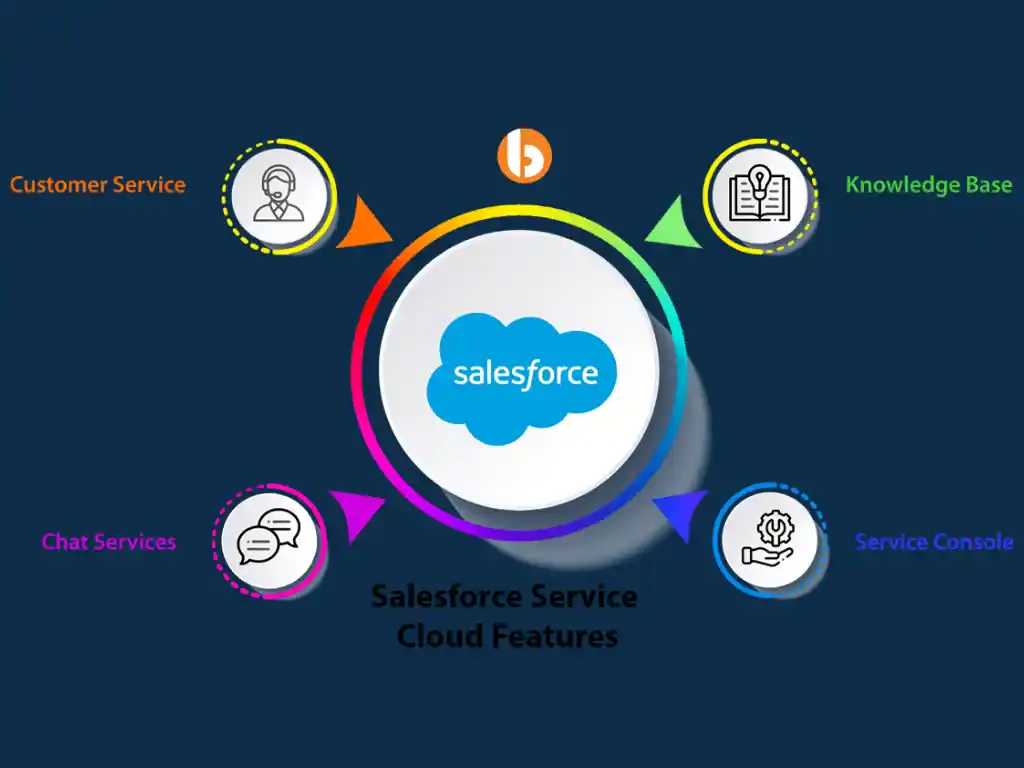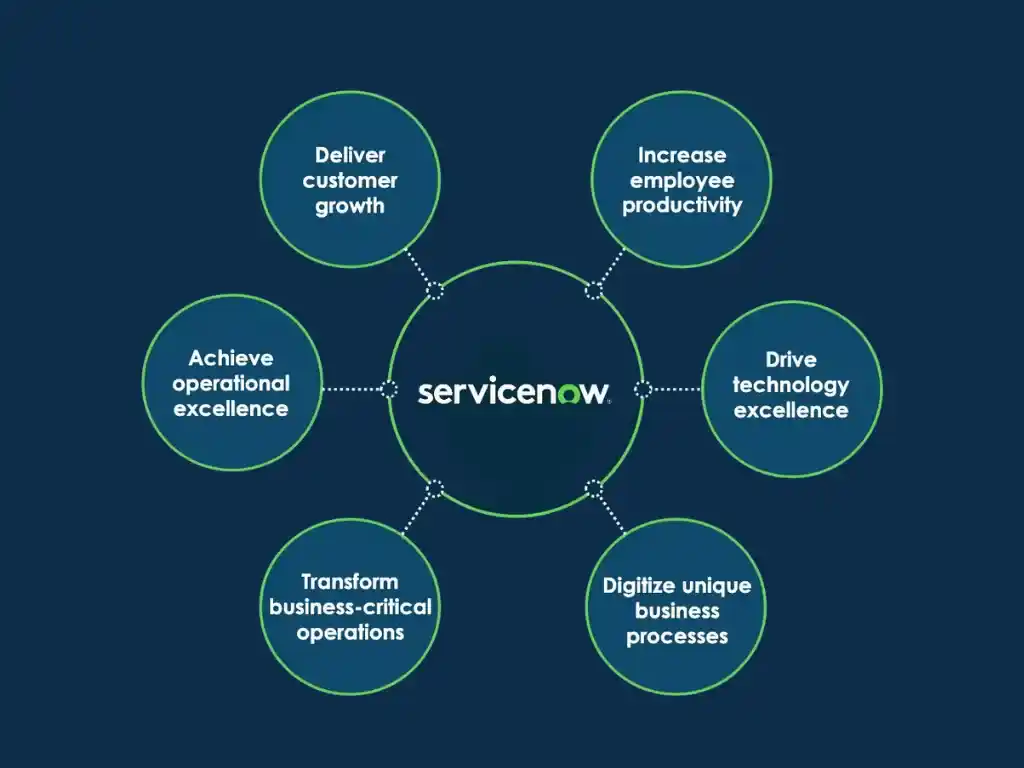Table of Contents
Introduction
In the ever-evolving landscape of enterprise software solutions, ServiceNow vs Salesforce stand out as two of the most prominent platforms. Each offers unique capabilities, catering to different business needs. While ServiceNow is renowned for its IT Service Management (ITSM) capabilities, Salesforce is the undisputed leader in Customer Relationship Management (CRM). This comprehensive comparison will explore these platforms’ features, benefits, and differences, helping businesses decide which solution best fits their needs.
What is Salesforce?
Salesforce is a prominent cloud-based customer relationship management (CRM) platform. It is an all-encompassing solution designed to manage and optimize workflows, catering to businesses of all sizes. From startups like Twilio to tech giants like Google, companies across the spectrum use Salesforce to manage and streamline their customer-centric workflows.
At its core, Salesforce is a customer-centric platform that enhances enterprise-customer relationships. It supports mobile and web applications, focusing on key areas such as lead, opportunity, marketing, and sales management. Its flexibility and scalability make it a preferred choice for businesses aiming to improve customer interactions and drive sales. Integrating a salesforce servicenow connector can further enhance efficiency by enabling seamless data flow between platforms, reducing manual tasks, and providing a unified view of customer service and sales operations.
What is ServiceNow?
ServiceNow is an emerging IT Service Management (ITSM) platform, gaining recognition for its robust capabilities in managing IT operations and backend services. However, its utility extends beyond IT, offering solutions for HR and customer management as well.
ServiceNow leverages machine learning to automate routine tasks, enhancing operational efficiency by reducing manual processes. It is primarily designed to manage and define structured IT services, making it an essential tool for IT operations. Notably, ServiceNow can boost ITSM efficiency by up to 60%, making it a valuable asset for organizations looking to optimize their IT processes.
Features of Salesforce vs ServiceNow
A feature-focused analysis reveals the unparalleled strengths of ServiceNow vs Salesforce, showcasing their unique contributions to business operations.

Features of Salesforce
Salesforce boasts a range of robust and versatile features that make it an excellent business solution:
- Opportunity Management: Salesforce helps sales teams manage and track potential deals throughout their sales cycle. It allows recording and monitoring of every opportunity’s details, such as close date, stage, amount, expected revenue, and probability.
- Sales Forecasting: Salesforce provides insights into customer behavior and sales opportunities, enabling businesses to forecast their sales strategies. It offers various forecasting methods, such as product, territory, opportunity revenue, and overlay split.
- Contact and Account Management: Salesforce centralizes customer information, allowing businesses to store and manage details like name, address, phone number, email, and contact history. This feature enables sales teams to track customer interactions and maintain consistent communication. For businesses planning deeper CRM customization or platform optimization, working with experienced Salesforce consulting services helps ensure Salesforce is implemented and scaled correctly to support long-term growth and operational efficiency.
- Email Integration: This feature allows seamless integration of emails, enabling users to send, receive, and track emails directly within Salesforce. It ensures that all customer interactions are documented and accessible.
- Lead Management: Salesforce streamlines the process of capturing, tracking, and managing leads. It automates workflows, prioritizes leads based on business metrics, and aids in converting leads into customers.
Features of ServiceNow

ServiceNow is known for its innovative features that enhance efficiency and streamline operations:
- IT Service Management (ITSM): ServiceNow’s ITSM suite helps manage IT services and activities. It provides tools for tracking issues, assigning them to designated personnel, and ensuring timely resolution.
- Workflow Automation: This feature automates routine tasks, reducing manual efforts and ensuring consistent processes. It covers everything from employee onboarding to payroll management, minimizing errors and saving time.
- Analytical Reporting: ServiceNow offers analytical tools that visualize operations, customer behavior, and sales trends through dynamic charts and graphs. This feature provides valuable insights for informed decision-making.
- IT Operations Management (ITOM): ServiceNow simplifies IT service delivery and management, helping teams manage incidents, problems, changes, and configurations efficiently.
- Customer Service Management: ServiceNow enhances customer experiences by streamlining support processes. It offers case management tools that help resolve customer queries and issues quickly, improving customer satisfaction.
Similarities Between ServiceNow vs Salesforce
Before delving into the differences between ServiceNow vs Salesforce, it’s essential to recognize their similarities:
- CRM Focus: Both platforms are CRM-based, making them suitable for managing customer interactions and hybrid working environments.
- Workflow Automation: Both ServiceNow vs Salesforce offer workflow automation capabilities, streamlining operations and enhancing efficiency.
- User-Friendly Interfaces: Both platforms provide user-friendly interfaces and are accessible via mobile devices.
- Integration Capabilities: While Salesforce has more extensive third-party app integrations, ServiceNow also offers integration options, albeit more limited.
- Customization: Both platforms allow customization to meet specific business requirements through development and configuration.
Comparison Table: ServiceNow vs Salesforce
| Feature | ServiceNow | Salesforce |
|---|---|---|
| Software Type | SaaS-based IT Service Management (ITSM) | SaaS-based Customer Relationship Management (CRM) |
| Primary Users | IT professionals, Operations teams | Sales, Marketing, Customer Service |
| CRM Focus | Internal service operations | Comprehensive CRM services |
| Versatility | IT operations and service management | Suitable for all business sizes |
| Language Support | English, French, German, Dutch, Spanish, Italian, Japanese, Portuguese | English, Portuguese, Spanish, Italian, Dutch, Swedish, French |
| Notable Clients | Spotify, American Express, Puma, Toyota | Accenture, Adidas, Microsoft, Pfizer |
| Performance | Focused on ITSM, faster page load times | Focused on CRM, broader scope |
| Implementation | Cloud-based, specialized in ITSM | Cloud and on-premises options, broader implementation scope |
| Usability | Designed for IT professionals | User-friendly for CRM users |
| Integration | Limited third-party app integrations | Extensive, supported by AppExchange |
| Customer Support | 24/7 support, Customer Service Management | 24/7 support, Service Cloud |
| Security | Multi-tenant architecture, role-based access | Data encryption, two-factor authentication |
| Pricing | Starts at approximately $70/user for ITSM | Starts at $25/month for basic plans |
| Future Scope | Growing in AI and customizable workflows | Dominant in cloud computing, expanding features |
Differences: ServiceNow vs Salesforce
While both platforms offer significant benefits, they serve different purposes and excel in distinct areas:
Performance
- ServiceNow: Excels in IT service management and automation, with an average page load time of 1.5 seconds and 99.9% uptime.
- Salesforce: Known for its CRM capabilities, Salesforce has an average page load time of 2.5 seconds and 99.9% uptime.
Implementation
- ServiceNow: Primarily designed for ITSM, available only as a cloud-based ServiceNow implementation service and solution.
- Salesforce: Versatile, available for CRM, and can be implemented both on-premises and in the cloud.
Usability
- ServiceNow: Best suited for IT professionals, focusing on technical operations and automation.
- Salesforce: More user-friendly for CRM users, supporting sales, marketing, and various other business functions.
Integration
- ServiceNow: Offers limited third-party integrations, requiring additional tools for comprehensive integration.
- Salesforce: Provides extensive integration capabilities, supported by AppExchange for third-party apps. Through AppExchange, Salesforce WhatsApp messaging plugs in as a two-way, on-record channel, sitting next to email and chat for unified case handling. With Salesforce third-party integration, businesses can extend the power of their CRM by connecting it with everyday tools like ERP, marketing automation, or collaboration platforms. This not only creates unified workflows but also gives teams a single source of truth for customer data. Meanwhile, companies adopting Salesforce DevOps can take this a step further by streamlining development, automating deployments, and strengthening security in their Salesforce environment. In practice, some organizations use both platforms together, which makes a servicenow salesforce integration relevant for day-to-day operations. It allows IT service workflows from ServiceNow to connect with customer and sales data in Salesforce, helping teams share context, reduce information gaps, and coordinate work more effectively across departments.
Customer Support
- ServiceNow: Offers 24/7 support through phone, chat, email, and FAQs.
- Salesforce: Provides multi-channel support through Service Cloud, including live chat, email, social media, and 24/7 phone support.
Security
- ServiceNow: Employs multi-tenant architecture with role-based access control and regular vulnerability scanning.
- Salesforce: Offers data encryption, two-factor authentication, and real-time activity tracking.
Pricing
- ServiceNow: ITSM services start at approximately $70 per user, with professional plans costing more.
- Salesforce: Basic plans start at $25 per month, with advanced options available at higher prices.
Future Scope
- ServiceNow: Growing in areas like AI and machine learning, with a projected market value of $12.2 billion by 2025.
- Salesforce: Expected to continue dominating the CRM space, with the market projected to reach $57 billion by 2025.
When to Use Salesforce vs ServiceNow
To determine whether to use Salesforce or ServiceNow, consider your business needs and also explore other software alternatives.
| Use Cases | Salesforce | ServiceNow |
|---|---|---|
| Customer Relationship Management | ✅ | ❌ |
| Workflow Automation | ✅ | ✅ |
| IT Operations | ❌ | ✅ |
| Custom Application Development | ✅ | ❌ |
| Sales and Marketing | ✅ | ❌ |
| Customer Services | ✅ | ✅ |
| Field Service Management | ✅ | ✅ |
| Enterprise-level Management | ✅ | ✅ |
Conclusion: ServiceNow vs Salesforce
Choosing between ServiceNow vs Salesforce is akin to selecting the perfect tool from a versatile toolkit—each has its strengths and unique benefits. If your business focuses on optimizing IT operations and technical processes, ServiceNow is the ideal choice. Conversely, if your goal is to enhance customer relationships and boost sales, Salesforce offers a comprehensive suite of tools designed for CRM.
Ultimately, the decision should be based on your specific business requirements. Whether you opt for ServiceNow vs Salesforce, both platforms offer robust features and a promising future. For businesses seeking a more tailored solution, collaborating with a Salesforce or ServiceNow development company can help customize the platform to meet your unique needs and deliver optimal results.